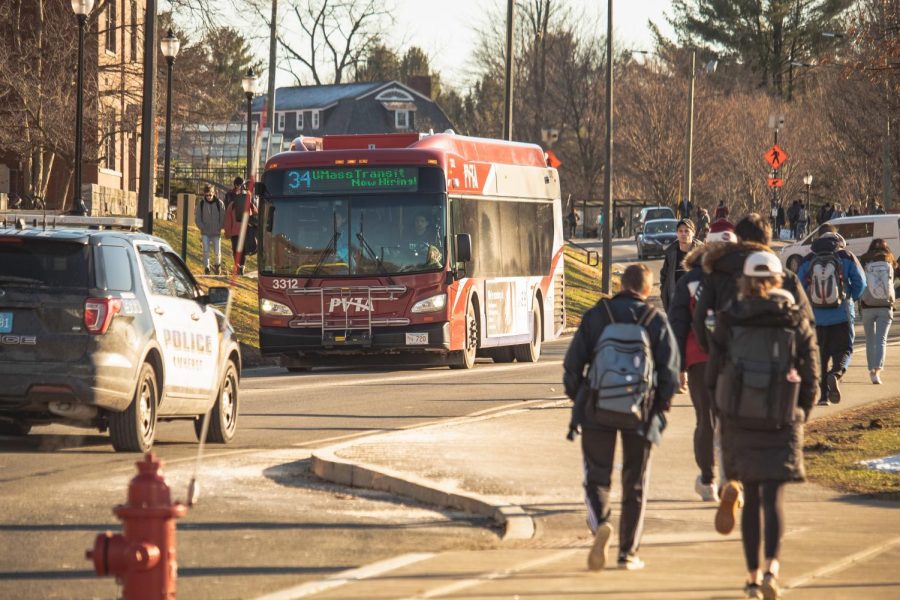On Sept. 19, the University of Massachusetts announced in an Instagram post that Pioneer Valley Transit bus routes 34 and 33 would be experiencing major service modifications due to a lack of drivers this fall.
The route 34 northbound campus bus now ends operations at 12:15 p.m. on weekdays. Additionally, the route 33 bus toward Puffer’s Pond began operating on a Sunday schedule on Saturdays, meaning that the bus will only run every 80 minutes. The driver shortage is one that follows a national trend of workplaces struggling to hire staff in the wake of the COVID-19 pandemic.
“The team at UMass Transit tried hard to keep service uninterrupted but could not succeed given the significantly lower than projected driver hours,” UMass Transit Interim Leader Lawrence Snyder said.
Route 34 from Sylvan via Orchard Hill is the only bus route that travels directly to the Sylvan Residential Area, which is located on Eastman Lane and is approximately a 10-minute walk to Worcester Dining Commons, making it one of the further areas from the main campus for students to live. Routes 33 and 35 have a stop at Sylvan if a passenger requests one, but the 34 is the only bus that makes a direct stop at the residential area.
Although many residents of Sylvan and Puffer’s Pond rely on the buses for transportation to and from campus, UMass Transit decided to cut these routes based on a “review” that showed they would have the “least impact,” according to Snyder.
He added that UMass Transit “prioritized morning service based upon ridership data and to help keep service unchanged during busier morning commutes, hopefully easing the impact on students trying to utilize the buses in order to make it to early classes.”
The reduction of the routes themselves isn’t the only thing that students are struggling with; considering the shortened availability of the Route 34 bus, students that live in Sylvan Residential Area are forced to find other routes to take, leading to significant overcrowding on the few available busses.
Seli Malave-Tomei, a junior psychology and public health sciences major said that she noticed that the route 35 bus is “almost always overcrowded.” She added that “there’s barely any space to sit, stand or even move, and the disability seats are being taken up, meaning if someone with a disability needed that space they wouldn’t be able to get it.”
Joe Ignacio, a sophomore history and neuroscience major, is a student driver for the PVTA. He said that the hours he works “aren’t really (his) issue,” but rather his “main gripe is with the actual law.”
Ignacio explained that because UMass Transit operates under the Massachusetts Department of Transportation, the establishment is forced to follow federal law. Due to marijuana being illegal on a federal level, drivers are subject to occasional and random drug screenings and could be fired if traces of the substance are found in their system.
When asked whether this rule could be a reason why students are apprehensive about working for UMass Transit, Ignacio agreed.
“I postulate that not being able to smoke is a large enough barrier to employment for a lot of people,” Ignacio said.
“If they took out the marijuana testing upon hire, more people would be willing to drive, since it is legal here in Massachusetts,” Malave-Tomei said. Malave-Tomei recognizes the same issue Ignacio does –– the federal funding for the PVTA creates an unfair barrier for blocking the regulations of marijuana in the UMass Transit division.
The route 33 and 34 buses will continue to operate on the altered schedule for the remainder of the fall 2022 semester. According to Synder, UMass Transit remains hopeful that the schedule will be re-evaluated this spring, hopefully opening more availability for routes to run at full capacity again.
“We are actively recruiting students with the goal to train more drivers for the spring semester and remove the reduced schedule.”
Lilyana Ricardo can be reached at [email protected] and followed on Twitter @lilyanaricardoo.


















